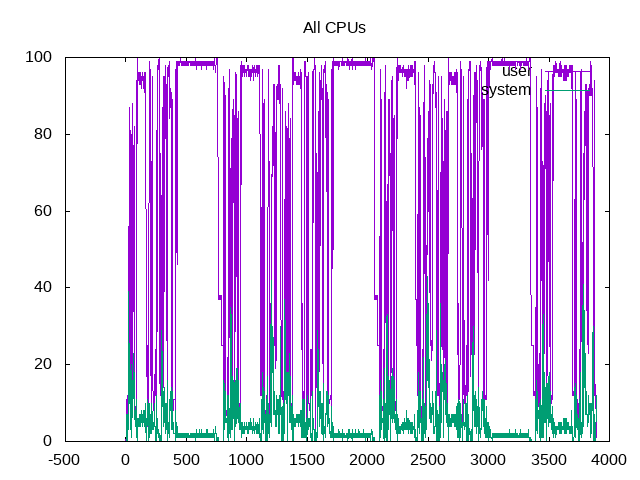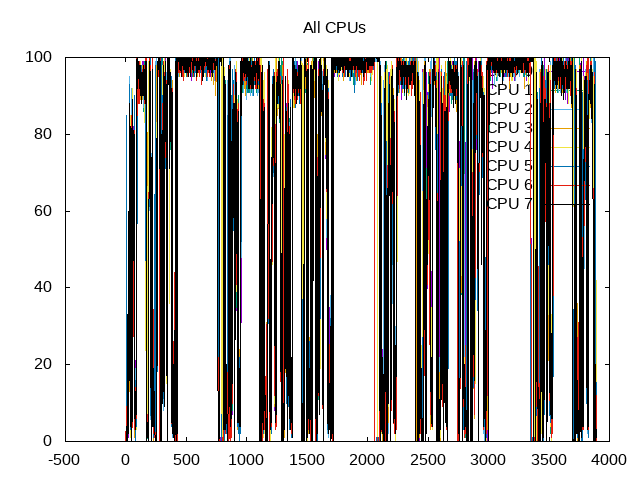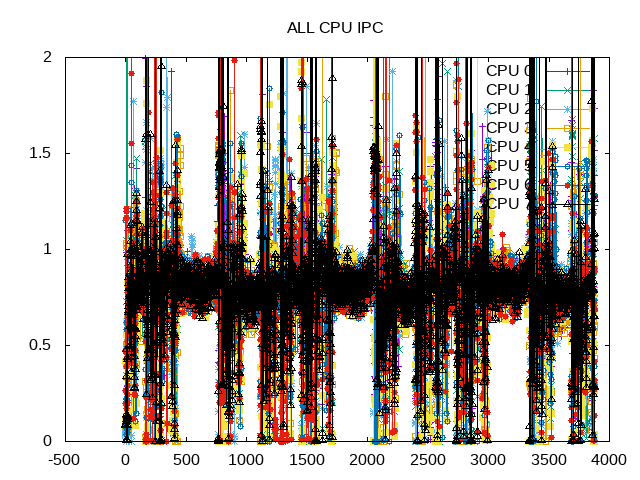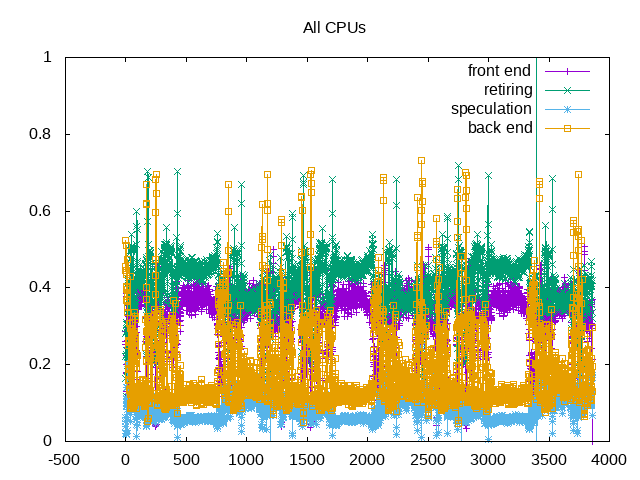This test times how long it takes to build the GNU Compiler Collection (GCC).
The test example below was building the latest (gcc 7.2.0) compiler. As part of the benchmark setup, it goes through a “download_prerequisites” step and also builds with the environment on the local system. Hence, this will make the benchmark robust to different environments, but also introduces an additional variable. The benchmark might behave differently not only because of different processors, but also of different execution environments.
Metrics (Intel) - phoronix/build-gccsh - pid 22890 On_CPU 0.722 On_Core 5.775 IPC 0.868 Retire 0.345 (34.5%) FrontEnd 0.361 (36.1%) Spec 0.210 (21.0%) Backend 0.083 (8.3%) Elapsed 1321.26 Procs 353475 Maxrss 633K Minflt 164920285 Majflt 0 Nvcsw 2584028 (68.0%) Nivcsw 1214887 Utime 7272.709321 Stime 357.995173 Start 157412.07 Finish 158733.33
The overall benchmark takes 22 minutes to build. During that time, parts of the build are parallel (e.g. many compiles) and parts are serial (e.g. a single link), hence the “On_CPU” amount is 0.722 partially because of inherent parallelism limits in the build and this might go down with more cores and time stretching out slightly. Having 68% of the context switches be voluntary suggests either I/O or more shorter processes or both.
Both the amount of speculative misses and the amount of front-end stalls are above average on average compared with other workloads. The total number of processes is over 350,000 and the benchmark runs 3x making this a reasonable stress test for wspy processtree generation with >1,000,000 total processes. Otherwise the process tree is too large to include here, but an inventory of what processes run follows. Many are short-lived where on-average each process accumulates 0.022 seconds of user+system time.
136379 bash
46703 sed
28526 rm
19807 cat
15836 basename
15039 as
12145 cc1
11336 xgcc
10630 mv
4918 autoconf
4563 grep
4174 expr
4077 dirname
4053 cc1plus
3655 mkdir
2996 ld
2679 gcc
2667 collect2
2179 rmdir
2175 ln
2084 xg++
1581 cp
1406 ?
1328 strip
1113 file
1080 which
948 uname
939 g++
678 cmp
627 config.status
533 print
505 make
495 automake
472 sort
466 tr
463 chmod
452 mawk
350 f951
330 gfortran
285 conftest
232 touch
225 hostname
216 ar
182 ls
169 diff
168 fixincl
150 nm
146 awk
122 ranlib
80 objdump
79 echo
75 install
65 sh
64 mktemp
64 find
61 arch
54 tmpmultilib3
49 a.out
42 uniq
42 getconf
39 makeinfo
38 sleep
30 tmpmultilib4
27 cc
24 tmpmultilib
24 msgmerge
24 cut
18 msgfmt
18 dd
16 true
14 move-if-change
12 xgettext
12 mt
12 genhooks
11 cc1obj
9 genpreds
9 genmodes
8 perl
8 genchecksum
6 tmpmultilib2
6 realpath
6 od
6 ld.gold
6 genmatch
6 gengtype
6 gen-fib
6 gencfn-macros
6 gen-bases
5 pod2man
4 tar
3 tail
3 readelf
3 mkheader.sh
3 head
3 gen-trialdivtab
3 gentarget-def
8 perl
8 genchecksum
6 tmpmultilib2
6 realpath
6 od
6 ld.gold
6 genmatch
6 gengtype
6 gen-fib
6 gencfn-macros
6 gen-bases
5 pod2man
4 tar
3 tail
3 readelf
3 mkheader.sh
3 head
3 gen-trialdivtab
3 gentarget-def
3 genrecog
3 gen-psqr
3 genpeep
3 genoutput
3 genopinit
3 genmddeps
3 gen-jacobitab
3 gengenrtl
3 genflags
3 gen-fac
3 genextract
3 genenums
3 genemit
3 genconstants
3 genconfig
3 gencondmd
3 genconditions
3 gencodes
3 gencheck
3 genautomata
3 genattrtab
3 genattr-common
3 genattr
3 gcov-iov
3 date
3 c++filt
3 bison
2 pwd
1 build-gcc
Metrics (AMD) - phoronix/build-gcc
sh - pid 31588
On_CPU 0.491
On_Core 7.848
IPC 0.856
FrontCyc 0.238 (23.8%)
BackCyc 0.099 (9.9%)
Elapsed 1108.81
Procs 353642
Maxrss 633K
Minflt 165383257
Majflt 0
Nvcsw 2534566 (66.8%)
Nivcsw 1261566
Utime 8251.230752
Stime 450.955154
Start 466348.86
Finish 467457.67
Comparing the metrics on my AMD system, the On_CPU percentage has dropped from 72% to 49% reflecting the workload isn’t as able to take advantage of extra cores as the serial parts of the build dominate. Otherwise the IPC is similar.

Plotting the total user time and system time across all cores shows times where the build is parallel and when it is much more intermittently single-threaded.
 About this graph
About this graph
Same plot as before, but separated out by core shows similar behavior.

The overall IPC mostly stays in a band slightly lower than 1.
 About this graph
About this graph
Front end tends to be the largest blocking issue, but also moderate amounts of bad speculation.
Next steps: Drill down further into front end stall to characterize further.
